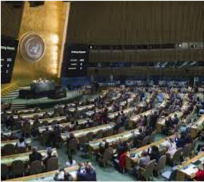122 Countries adopts historic global treaty to ban Nuclear Weapons
The United Nations has adopted a historic global treaty banning nuclear weapons. The treaty was adopted by a vote of 122 members in favour. The Netherlands was the only country who voted against the treaty. Singapore abstained from voting.
Costa Rica’s ambassador, Elayne Whyte Gomez, was the president of the UN conference that negotiated the treaty. Nearly 129 countries signed up to take part in the drafting of the treaty which represents two-thirds of the UN’s193 member states. Nearly 141 countries led by Austria, Brazil, Mexico, South Africa and New Zealand drafted the treaty in a hope that the treaty would increase pressure on the nuclear powers to take disarmament more seriously.
The treaty would be opened for signature on September 20. It will enter into force once 50 countries ratified it. All of the ratifying countries should never under any circumstances develop, test, produce, manufacture, otherwise acquire, possess or stockpile nuclear weapons or other nuclear explosive devices. The treaty also bans any transfer or use of nuclear weapons or nuclear explosive devices.
Opposition
The nine nuclear powers, namely, the United States, Russia, Britain, China, France, India, Pakistan, North Korea and Israel neither took part in the negotiations nor cast their vote. Even Japan the sole sufferer of atomic attack refrained from taking part in the negotiations. Most of the NATO countries too boycotted the negotiations.
The nuclear powers view the treaty as unrealistic and argue that it will not have any impact on reducing the global stockpile of 15000 atomic weapons. According to the nuclear powers, their nuclear arsenals serve as a deterrent against nuclear attacks and they remain committed to the nuclear Non-Proliferation Treaty (NPT). The NPT seeks to prevent the spread of nuclear weapons and puts the onus on nuclear states to reduce their stockpiles.
But the non-nuclear states are increasingly worried about the slow pace of disarmament and are concerned that weapons of mass destruction may fall into the wrong hands.
Month: Current Affairs - July, 2017


